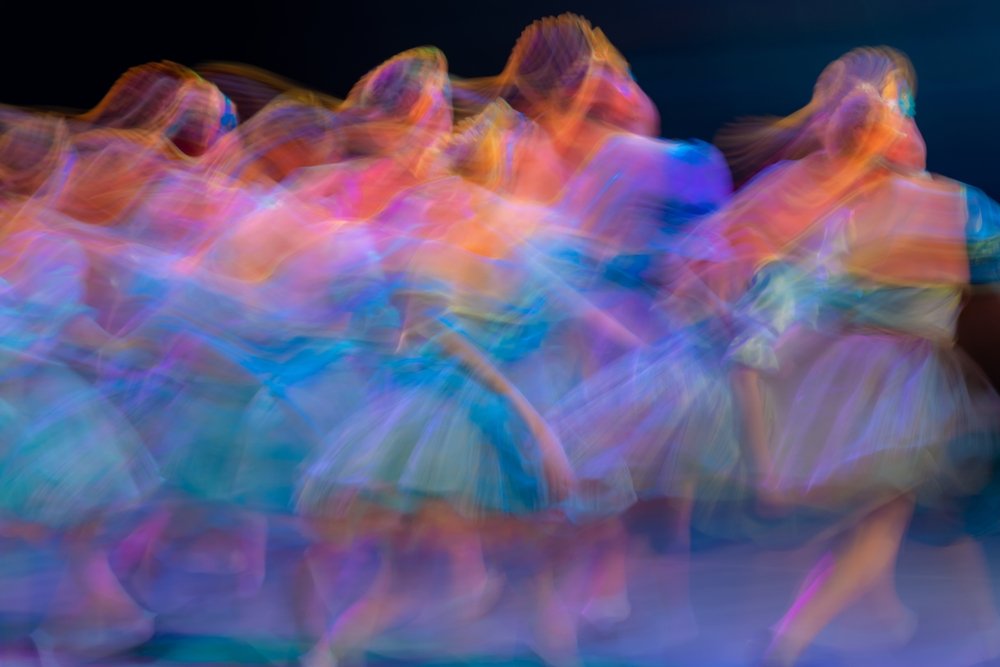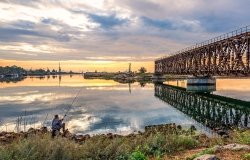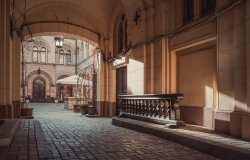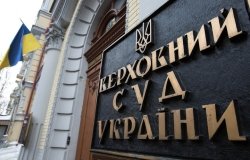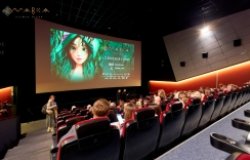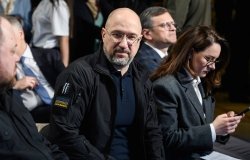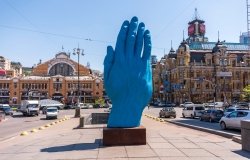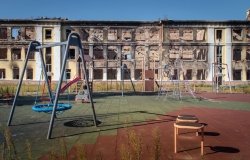
A blog of the Kennan Institute
Discovering the Contemporary through the Ancient
On the afternoon of December 29, Mykolaiv native and dancer Nana Biakova performed a new piece inspired by her shipbuilding city’s large objects—vessels, construction cranes, drawbridges—as well as things in her own apartment, which remained empty during the war in Ukraine. Using her body, Biakova explored the invisible relationship between animate and inanimate objects, boundaries, transient properties, and memory patterns.
She did so by drawing on her studies of ankoku butō, a Japanese avant-garde dance and performance form which she explored while training in Tokyo at the Keio Art Archives, as well as with current dance masters. Biakova perfected the methods of her work in Tokyo while participating in an art residency and taking part in an online art residency, both organized by Co.iki. During these residencies, she explored the deserted coast city of Miyazaki, as well as the lost objects that were brought there by the ocean during a typhoon. It was there that she began to memorialize the city where she was born and explore the movement patterns of her own corporeal memory.
The shipbuilding city of Mykolaiv, founded in 1789, has suffered throughout the war. A city of half a million residents prior to the war, Mykolaiv became a prime target of Russian efforts to deny Ukraine access to the Black Sea. Russian rockets and drones, together with fierce fighting, destroyed much of the cityscape, including critical infrastructure and the drama theater. The local arts community nonetheless has persevered (see blog post of November 4, 2022). Biakova’s performance, Lost Movement, represents a new stage of such resistance.
The Antonin Artaud Fellowship program supported this performance. Established in 2022 by the Proto Produkciia Agency and Opera Aperta Laboratory, the Artaud Fellowships represent a long-term commitment to Ukraine’s performing arts community by several domestic and international funders. The program provides funding for emerging artists and cultural managers as an investment in an enduring arts community in Ukraine. So far, the fellowship has supported works from 19 artists and led to a series of performances, workshops, and lectures. These efforts include opportunities for recipients to take their work abroad.
Biakova is one of six artists funded through a special initiative focusing on Ukraine’s south. Following a workshop in Odesa, artists from Mykolaiv, Odesa, Zaporizhzha, and Kherson created a half dozen new works which they have performed in their home cities, as Biakova did in Mykolaiv in December. Other works include the Odesa dance performance of Viktoriia Horoshilova and Oleksandr Loginov in December, exploring artistic representations of the body based on art at the city’s Museum of Western and Eastern Art, as well as an opera created by the Odesa Chamber Opera called Wulf Men, exploring the relationship between Sigmund Freud and a patient from a prominent Odesa family.
Biakova's Lost Movement provided a brief respite from the adversities of war, and a glimpse at possible new paths for Ukrainian arts in the future. A new generation of artists shaped by the conflict are moving beyond the question of Ukrainian identity. Issues of who is Ukrainian and what is Ukraine have been settled on the battlefield. Confident in their Ukrainian identity, rising creative talents are mobilizing to explore how their culture relates to the wider world. In doing so, they have turned to performance opportunities in Europe and to artistic visions from Japan. They look to the future by borrowing from multiple pasts.
The opinions expressed in this article are those solely of the author and do not reflect the views of the Kennan Institute
See our newest content first.
Subscribe to receive the latest analysis from Focus Ukraine
About the Author

Blair A. Ruble
Former Wilson Center Vice President for Programs (2014-2017); Director of the Comparative Urban Studies Program/Urban Sustainability Laboratory (1992-2017); Director of the Kennan Institute for Advanced Russian Studies (1989-2012) and Director of the Program on Global Sustainability and Resilience (2012-2014)

Kennan Institute
The Kennan Institute is the premier US center for advanced research on Eurasia and the oldest and largest regional program at the Woodrow Wilson International Center for Scholars. The Kennan Institute is committed to improving American understanding of Russia, Ukraine, Central Asia, the South Caucasus, and the surrounding region though research and exchange. Read more


